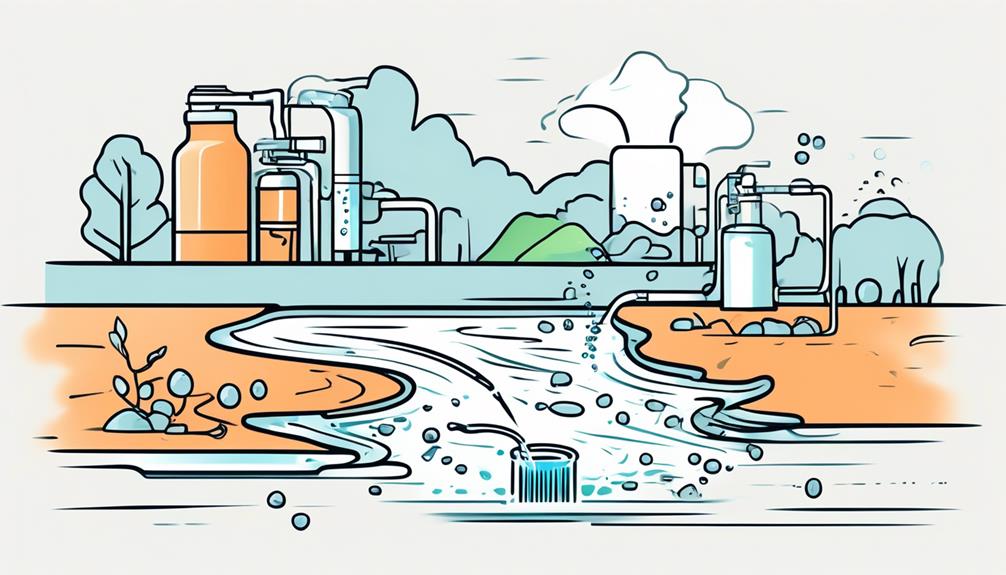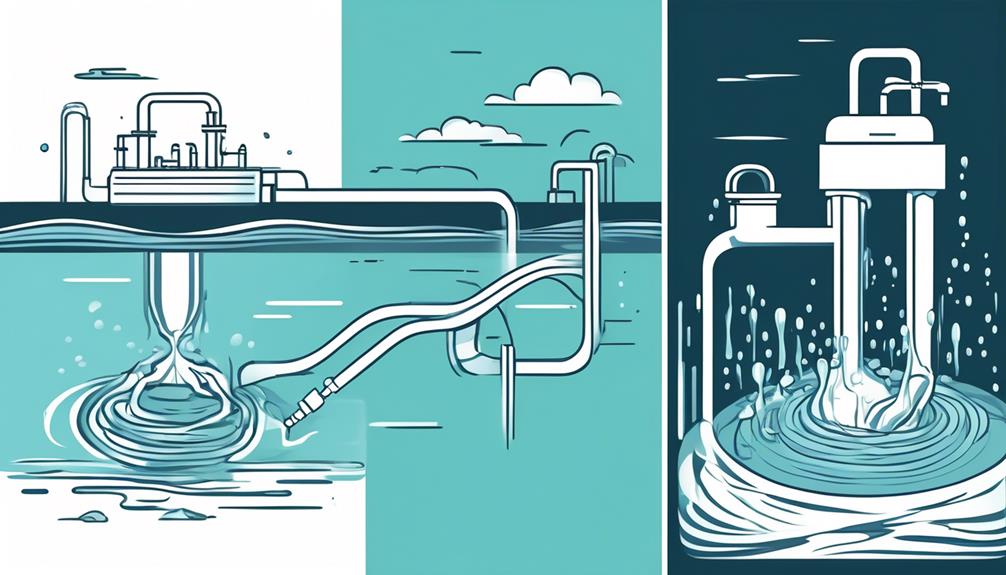Imagine this scenario: you're out hiking and come across a pristine-looking stream. It may seem inviting, but did you know that drinking untreated water from such sources can put your health at serious risk?
From harmful bacteria to parasites lurking in untreated water, the dangers are real. But why exactly does untreated water pose such threats to your well-being?
Stay tuned to uncover the hidden risks that might make you think twice before taking a sip from that crystal-clear stream.
Key Takeaways
- Untreated water contains harmful pathogens like bacteria, parasites, and viruses which can lead to serious illnesses like diarrhea, cholera, and typhoid fever.
- Consuming contaminated water poses significant health risks, especially for children, with long-term effects including chronic health issues and weakened immune systems.
- Prolonged exposure to untreated water can result in severe consequences such as kidney damage, cardiovascular diseases, and increased cancer risks due to certain chemicals.
- Proper water treatment through filtration, disinfection, and chemical processes is crucial to safeguard public health, prevent waterborne diseases, and ensure clean and safe drinking water for all.
Waterborne Diseases: An Overview
Waterborne diseases pose a significant health risk due to contaminated water sources. When you drink water contaminated with harmful pathogens like bacteria, viruses, or parasites, your body becomes vulnerable to illnesses like diarrhea, cholera, typhoid fever, and dysentery. These diseases can spread rapidly through communities, especially in areas where clean water is scarce.
Imagine microscopic germs swimming in the water you rely on every day for drinking, cooking, and washing. Without proper treatment, these invisible threats can enter your body and cause serious health issues. Symptoms may include stomach cramps, nausea, vomiting, and dehydration, impacting your daily life and productivity.
Preventing waterborne diseases requires access to clean, treated water and proper sanitation practices. By understanding the risks associated with untreated water, you can take steps to protect yourself and your loved ones from these harmful infections. Stay informed and proactive in ensuring the water you consume is safe and free from dangerous contaminants.
Common Pathogens in Untreated Water
Imagine tiny but harmful bacteria lurking in untreated water, ready to cause havoc once ingested.
These invisible threats can be accompanied by viruses and parasites, creating a trifecta of potential health risks.
Stay tuned to learn more about these common pathogens and how they can impact your well-being.
Harmful Bacteria Presence
Untreated water harbors a variety of harmful bacteria, posing significant health risks to those who come into contact with it. These bacteria are common pathogens found in untreated water sources and can lead to various illnesses if consumed or if the water comes in contact with open wounds. Here are some of the most common harmful bacteria present in untreated water:
| Bacteria | Health Risks |
|---|---|
| E. coli | Severe gastrointestinal infections |
| Salmonella | Typhoid fever, food poisoning |
| Campylobacter | Diarrheal diseases |
| Giardia | Giardiasis (intestinal infection) |
| Cryptosporidium | Severe diarrhea and cramps |
It is crucial to treat water properly to eliminate these harmful bacteria and prevent waterborne illnesses.
Viruses and Parasites
Coming into contact with harmful bacteria in untreated water can lead to various illnesses. Similarly, viruses and parasites lurking in these water sources also pose significant health risks. Viruses like norovirus and hepatitis A, along with parasites such as Giardia and Cryptosporidium, are commonly found in untreated water. These microscopic organisms can cause severe gastrointestinal issues like vomiting, diarrhea, and stomach cramps. Moreover, they can lead to more serious conditions like liver inflammation and prolonged digestive problems.
Unlike bacteria, viruses and parasites aren't killed by boiling water, making it crucial to treat water properly before consumption. Protect yourself from these invisible threats by ensuring your water undergoes proper filtration and disinfection processes.
Health Risks of Consuming Contaminated Water
When you drink contaminated water, you're at risk of waterborne diseases like cholera and typhoid fever. Children, especially, are vulnerable to these illnesses and can suffer severe consequences.
The long-term effects of consuming contaminated water can lead to chronic health issues that may persist for years.
Waterborne Diseases Risk
Consuming contaminated water poses a serious health risk due to the presence of waterborne diseases. When you drink water contaminated with harmful pathogens, you expose yourself to various health issues:
- Diarrhea: Bacteria like E. coli and parasites such as Giardia can cause severe diarrhea, leading to dehydration and electrolyte imbalances.
- Hepatitis A: This viral infection affects the liver and can be contracted by consuming water contaminated with fecal matter.
- Cholera: Contaminated water sources can harbor the Vibrio cholerae bacterium, causing severe watery diarrhea and dehydration, which can be fatal if not treated promptly.
Impact on Children
Children face heightened health risks when exposed to contaminated water sources, increasing their vulnerability to various waterborne diseases. The impact of consuming untreated water can be severe, especially for young ones whose immune systems are still developing. Here are some health risks children may encounter when consuming contaminated water:
| Health Risk | Description |
|---|---|
| Diarrhea | Can lead to dehydration and malnutrition |
| Cholera | Causes severe diarrhea and dehydration |
| Typhoid Fever | Results in high fever and weakness |
| Hepatitis A | Affects the liver and causes jaundice |
It is crucial to ensure that children have access to clean and treated water to safeguard their health and well-being.
Long-Term Health Effects
Exposure to contaminated water over an extended period can have significant long-term health effects on individuals. Here are some potential risks you may face from consuming untreated water regularly:
- Chronic Illnesses: Prolonged exposure to contaminants like heavy metals or bacteria can lead to chronic conditions such as kidney damage, liver problems, or cardiovascular diseases.
- Weakened Immune System: Drinking contaminated water over time may weaken your immune system, making you more susceptible to illnesses and infections.
- Development of Cancer: Certain chemicals found in untreated water sources have been linked to an increased risk of developing cancer over the long term.
Impact of Untreated Water on Public Health

Untreated water poses significant health risks for individuals due to the presence of harmful pathogens and contaminants. When consumed or used for daily activities, untreated water can lead to various health issues, impacting public health on a larger scale. Here's a breakdown of the impact of untreated water on public health:
| Health Impact | Description | Example |
|---|---|---|
| Waterborne Diseases | Diseases spread through contaminated water sources | Cholera outbreaks |
| Gastrointestinal Issues | Stomach and intestinal problems due to pathogens | Diarrhea and vomiting |
| Skin Infections | Infections caused by exposure to contaminated water | Rashes and dermatitis |
These health impacts highlight the importance of treating water before consumption or use to prevent the spread of diseases and infections. By ensuring that water goes through proper treatment processes, communities can safeguard public health and reduce the risks associated with untreated water.
Prevention Strategies for Waterborne Illnesses
To protect against the health risks associated with untreated water, implementing effective prevention strategies for waterborne illnesses is crucial. Here are three key steps you can take to safeguard yourself and your family:
- Boil Water: Boiling water is one of the simplest and most effective ways to kill harmful bacteria, viruses, and parasites that may be present in untreated water. Remember to boil water for at least one minute to ensure it's safe for consumption.
- Use Water Filtration Systems: Installing water filtration systems at home can help remove impurities and contaminants from untreated water. These systems work by passing water through various filters that trap harmful particles, ensuring cleaner and safer drinking water.
- Practice Proper Hygiene: Maintaining good hygiene practices, such as washing hands with clean water and soap before eating or preparing food, can significantly reduce the risk of waterborne illnesses. Additionally, avoid swallowing untreated water while swimming or engaging in water activities to prevent infections.
Importance of Water Treatment Technologies

Water treatment technologies play a vital role in ensuring the safety and purity of our drinking water supply. These technologies act as guardians, purifying water from harmful contaminants and pathogens that can cause serious health issues if consumed.
Imagine a world where water flows untreated into your glass, carrying invisible threats that could make you sick. Water treatment plants use a combination of processes like filtration, disinfection, and chemical treatments to remove impurities and make water safe for consumption.
Picture microscopic bacteria, viruses, and chemicals being trapped and eliminated, leaving behind clean, clear water ready for you to drink without worry. Without these technologies, waterborne illnesses could spread rapidly, affecting communities and putting lives at risk.
Frequently Asked Questions
Can Untreated Water Cause Long-Term Health Effects Even After a Person Stops Drinking It?
Untreated water can indeed cause long-term health effects even after you stop drinking it. Contaminants like bacteria, parasites, and chemicals may linger in your system, leading to prolonged health issues. It's crucial to prioritize safe drinking water.
How Do Waterborne Diseases Impact Vulnerable Populations, Such as Children and the Elderly?
When waterborne diseases strike vulnerable populations like children and the elderly, they can wreak havoc on their bodies, causing severe illnesses and even leading to life-threatening situations. It's like a storm in a teacup!
Are There Any Natural Remedies or Alternative Methods for Treating Contaminated Water in Emergency Situations?
In emergency situations, you can use natural remedies like boiling water, using chlorine drops, or solar disinfection. These methods help purify contaminated water, making it safer to drink and reducing health risks associated with untreated water.
What Are the Economic Implications of Untreated Water on a Community's Healthcare System?
Untreated water strains a community's healthcare system economically. Costs surge due to treating waterborne illnesses. Funds that could enhance healthcare facilities are redirected to combat preventable diseases. Investing in clean water saves lives and money.
How Do Climate Change and Environmental Factors Contribute to the Spread of Waterborne Illnesses in Untreated Water Sources?
You might be surprised at how climate change and environmental factors drastically boost the spread of waterborne illnesses in untreated sources. The impact can be catastrophic, leading to widespread health crises if left unaddressed.
Conclusion
So, next time you're tempted to drink untreated water, remember the saying, 'Don't count your chickens before they hatch.'
Because when it comes to waterborne diseases, you never know what harmful pathogens might be lurking in that seemingly harmless liquid.
Stay safe, stay healthy, and always opt for treated water to avoid serious health risks. Your well-being is worth the extra precaution!
